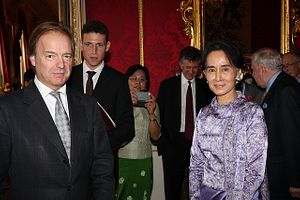The last three years in Burma have seen remarkable change, as the country starts out on the hard, but essential, journey towards democracy. Working closely with the U.S. and the international community, the U.K. has supported Burma’s progress. We continue to work with the government, political parties, and armed groups to reach a nationwide ceasefire and establish an inclusive nationwide political dialogue. But there is still much to do to ensure Burma continues to move forward on its path to democracy.
There is a special affection for Burma in the U.K., given our shared history, and the close ties many people still have with Daw Aung San Suu Kyi from her days living in Oxford. I have been fortunate enough to visit Burma twice recently, including trips to Rakhine State in 2012 and to Kachin State earlier this year, the first British Minister to travel to the latter since Burma’s independence.
The U.K. has responded to the remarkable changes in Burma by lifting EU sanctions, in close coordination with the U.S. We have also re-engaged with the military through the reappointment of a Defence Attaché and have begun delivering limited military non-combat education courses. It is our belief that we must be proactive in our engagement with the Burmese military and show them how a military is expected to behave in a modern democracy.
Being a true friend to Burma also means being an honest friend. We have been honest that much more needs to be done: including constitutional changes, achieving a peace settlement with the ethnic groups, and improving human rights. There remains an urgent need to tackle the humanitarian situation and underlying inter-communal tensions in Rakhine State and elsewhere in the country. And most importantly, progress on all of this will depend on a robust, transparent and inclusive process, starting now, for delivering a credible general election next year. The international community must maintain its attention, offer its support, and keep up its collective pressure.
Today [June 15] I am in Washington for talks with my U.S. colleagues, and to give a speech on the U.K.’s approach to the Asia-Pacific. Travelling around the Capitol, the iconic monuments bring to mind some of the great slogans of America’s democratic journey. The US declared its independence from Great Britain saying that its people had an inalienable right to “life, liberty and the pursuit of happiness.” The importance of this ideal struck me forcibly during my discussions on the changes now taking place in Burma.
There have been, and will be, bumps along the road in Burma’s difficult transition. There will be calls to disengage, withdraw to the sidelines, to wash our hands of seemingly intractable issues facing the country. But if we believe all the people of Burma deserve the right to elect their leaders, and to enjoy those freedoms we take for granted, then we have to stay the course. The U.S., U.K. and EU have valuable experience to offer to the reformist administration in Burma, as honest friends. And the wider international community – from Burma’s closest neighbors, to the influential emerging democracies worldwide – can play valuable roles too: lending a helping hand, whilst being clear and honest when concerns arise.
Standing in the shadow of America’s democratic heroes, I firmly believe that with the support of countries such as the U.K. and U.S., and with the determined efforts of the people of Burma, great strides will continue to be made. I am with Lincoln as “a firm believer in the people. If given the truth, they can be depended upon to meet any national crises.”
The Rt Hon Hugo Swire MP is Minister of State at the U.K.’s Foreign & Commonwealth Office.
































